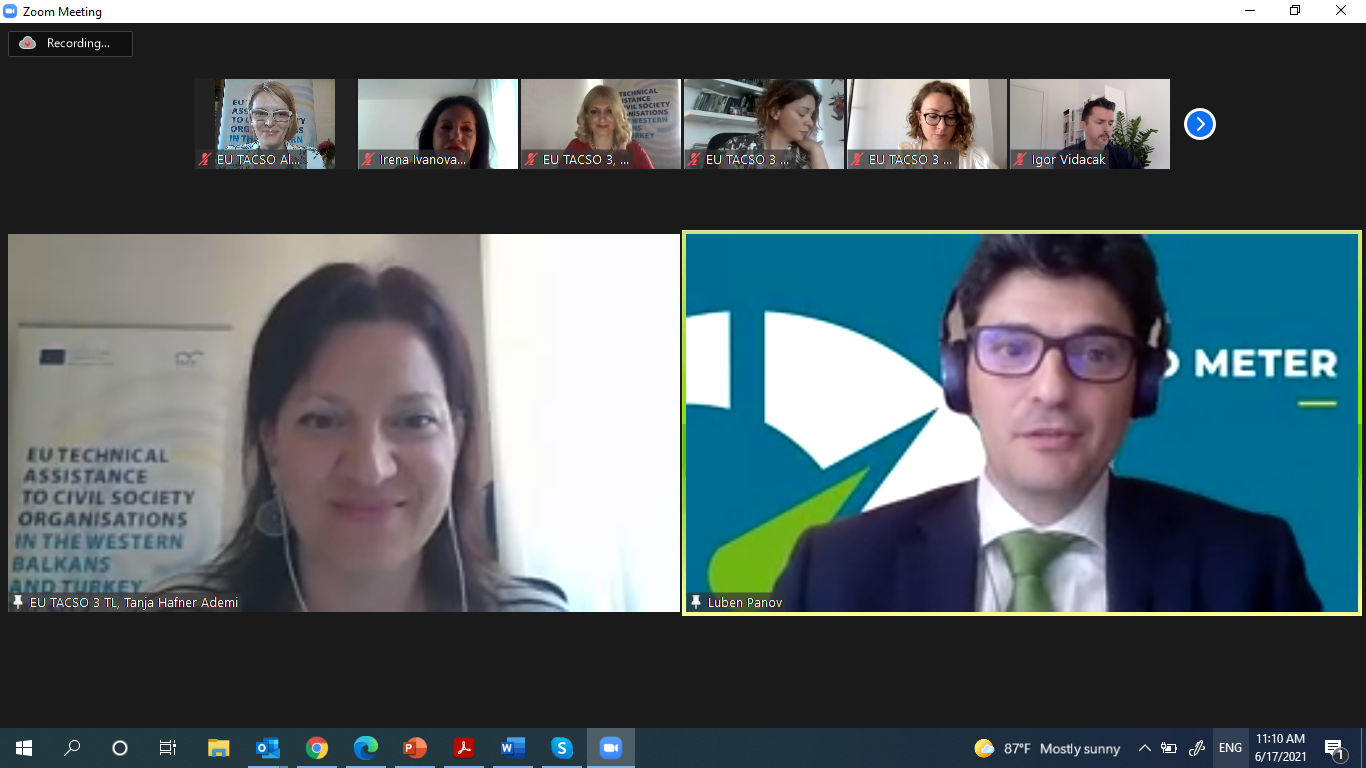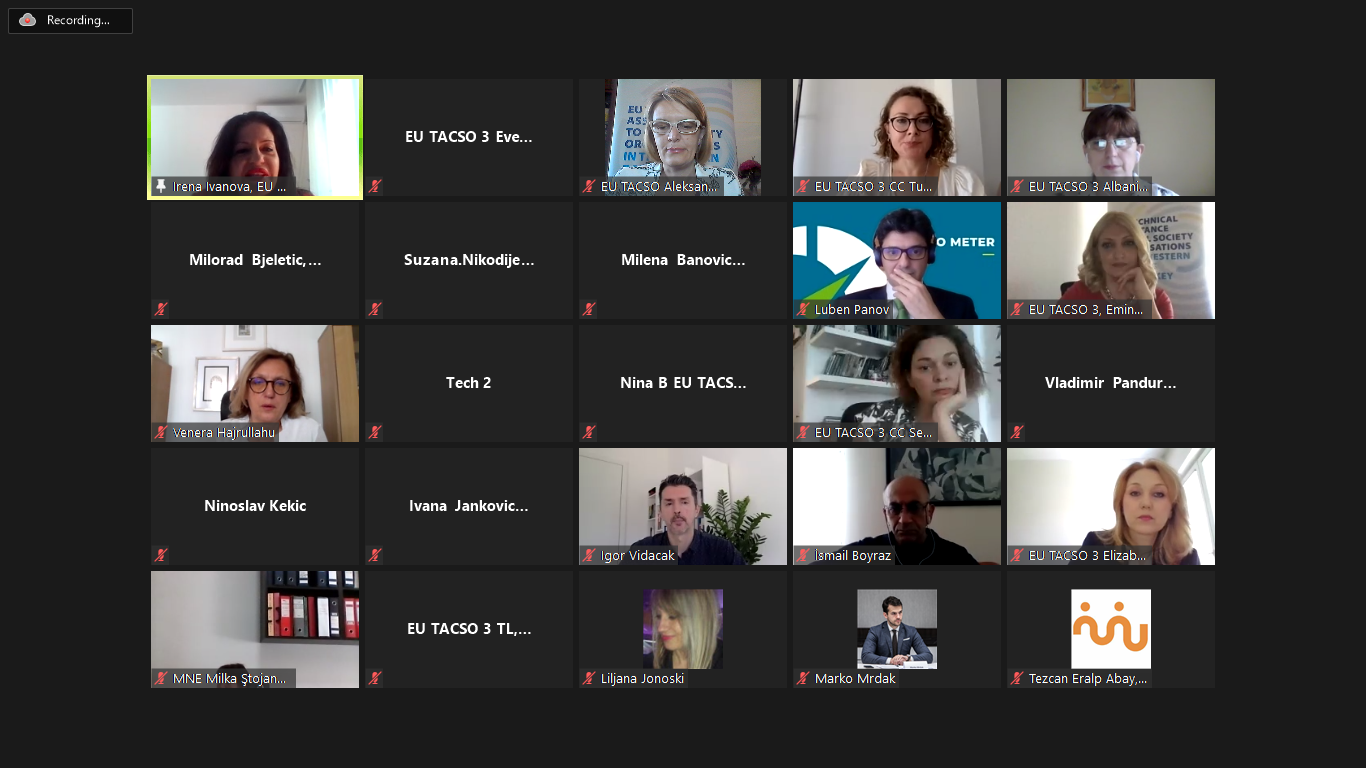
On 17 and 18 June, a People to People (P2P) exchange event under the title “Cooperation Between CSOs and State Institutions: Efficiency and Effectiveness of the Councils for Cooperation in the Enlargement Region”, was organised by the EU TACSO 3 project.
More than 40 representatives of CSOs and public institutions, mainly members of the Councils for cooperation in Albania, Bosnia and Herzegovina, Kosovo*, Montenegro and North Macedonia, as well as CSOs working on the topic and relevant public institution representatives from Serbia and Turkey attended the event.
The event aimed to discuss the needs and benefits of cooperation of CSOs with public authorities and particularly to share the current practices, to discuss the effectiveness and efficiency of the Councils and to learn from best practice examples about current trends of civil dialogue in the Enlargement region and the EU Member States, provided by experts.
During the first session, task managers from the EUD in North Macedonia and Kosovo emphasized that functional mechanisms for dialogue between CSOs and public institutions are crucial elements of a conducive environment for civil society. Two experts presented a comparative overview of the civil dialogue and cooperation in EU Members States such as Bulgaria, Estonia, Slovenia, Cyprus, as well as presented in detail a case study of the Croatian Council for Cooperation as a role model for the rest of the Councils in the Western Balkans and Turkey (WBT).
They also summarised the WBT state of play and lessons learned for all existing Councils for cooperation and provided a view on why the mechanisms for dialogue are needed. Mainly, it is a need of putting and maintaining civil society policy issues on the government agenda and enabling regular opportunities for structured dialogue between government and civil society on shaping policies affecting the work of CSOs. Also, one of the needs is to generate consensus among government and CSO actors on strategic priorities of creating enabling environment for civil society development and strengthening accountability of government bodies responsible for implementing strategic policy measures affecting the work of CSOs. Councils also should contribute to building trust between government and civil society.
Through the second session, speakers from Albania, Bosnia and Herzegovina and North Macedonia initiated the discussion on the scope of work of the Councils, their mandate and leadership, as well as the factors for their effective and efficient work. All participants had the opportunity to share their experience, to ask and to recommend solutions for improving the cooperation between CSOs and public institutions.
On the second day of the event, representatives from Croatia, Montenegro, Kosovo, Turkey, North Macedonia and Serbia, exchanged their views on the composition of the Councils, criteria and selection procedure, as well as transparency and communication towards the rest of the civil society. The resources needed for effective work of the Councils and the preconditions required for establishing and functioning of the mechanisms for cooperation were also discussed.
It was discussed that the Councils’ effectiveness depends on the respect of fundamental freedoms, the existence of clear government policy (or long-term strategic framework) for supporting civil society, favorable political discourses, and demand for CSOs inputs through the Council. Also, a crucial role has the clarity of the mandate and scope of work of the Councils. In addition, monitoring the impact of the Council’s work is significant, which means the Council needs to follow up on their opinions and decisions.

Conclusions and Recommendations:
Some of the main conclusions and recommendations at the end of the event were the following:
- Councils for cooperation are needed instruments for improving civic dialogue, but the context and degree of fundamental freedoms, including the civic space, should be considered the central precondition. In this line, it was concluded that cooperation works only if there is a genuine interest, mutual trust, and political will to support and promote civil society;
- Councils should not, in any case, replace the public consultation, but they should be used and seen as a tool to accelerate it;
- For more efficient and effective work, Councils for cooperation should have focus and priorities because they cannot cover all topics and cannot make informed decisions on all issues and aspects relevant for civil society development;
- Transparency is essential, especially in increasing the trust among Council’s members and public institutions and CSOs and the rest of civil society and the general public. Thus, more accessible documents, proactiveness and on-time provided information for the discussions and decisions from Councils’ sessions is needed. Related to this, awareness-raising of public officials on the main values, purpose and challenges of government-CSO cooperation (contributing to the change of political discourse on CSO and change of public perception) is recommended, including ensuring the presence of adequate hierarchical level and commitment of government representatives to contributing to Council sessions;
- There is a need for more consistent, coherent and strategic use of EU conditionality instruments to support meaningful government-CSO policy dialogue mechanisms;
- Capacity building of secretariats of the Councils is required, as well as building capacities of CSOs for effective engagement in policy dialogue and support to effective communication of the Council work among CSOs and the wider public
* This designation is without prejudice to positions on status, and is in line with UNSCR 1244/1999 and the ICJ opinion on the Kosovo declaration of independence.
